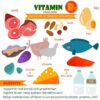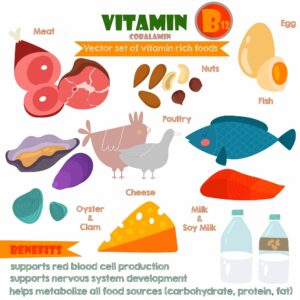
What Can Vitamin B12 Do for Your Eyes?
Vitamin B12 is truly one of the building blocks of health. Our bodies use it to create red blood cells, synthesize DNA, and support critical functions in our nervous symptoms. But what is the role of B12 for your eyes?
In the big world of nutrition, many people forget to think about how the nutrients we consume impact our eyes. We’re often more concerned about things like weight loss or cholesterol levels. And, while the body is interconnected enough that caring for other aspects of our health ultimately benefits our vision, it’s still important to consider how nutrition can directly support our eyes. After all, our eyes are delicate organs and require a mix of nutrients to function optimally. Vitamin B12 is among them, although researchers are still learning more about its exact role in maintaining eye health.
 The Basics of B12
The Basics of B12
Chemically, vitamin B12 is a big, complex molecule, and it’s one that the human body doesn’t produce naturally. So, we need to get our supply of this crucial nutrient through our diet.
Fortunately, B12 can be found in most animal products. Seafood, particularly shellfish, is an excellent source of B12, as are dairy products and eggs. Liver is a little off the beaten dietary path for some, but it’s an incredible source of many vitamins, including B12. But if you don’t eat meat for whatever reason, B12 can be a little more difficult to come by.
Luckily, vegans and vegetarians can take advantage of a wide range of B12-fortified products. If you’ve ever noticed a “vitamin fortified” label on your cereal or granola bar, this is usually what it’s talking about. Vegetarians can also get B12 by eating nutritional yeast, a powdery substance that tastes similar to Parmesan cheese. It’s great on popcorn and pasta!
Often, just consuming these foods doesn’t provide enough B12 for non-meat-eaters, and so supplements are also necessary to keep the body functioning properly.
Effects of B12 on the Body
B12 is critical to a variety of essential bodily functions. So, not consuming enough B12 can lead to serious issues if untreated.
Weakness, pale pallor, and light-headedness are all early signs of B12 deficiency. These can progress to bleeding and bruising issues, as well as stomach and intestinal difficulties. Without vitamin B12, the sheaths around nerves also become damage-prone; in severe cases, neurological symptoms will eventually appear, including poor memory, difficulty thinking and concentrating, and even personality changes. These are some of the most serious symptoms of vitamin B12 deficiency.
There are also some, but not many, warning signs of B12 deficiency seen in eyes. Sometimes, a B12 deficiency can enhance the appearance of dark circles under the eyes. This is usually due to paler skin and water retention caused by the deficiency. Some B12-deficient individuals may also experience red eyes, but this is typically a side effect of the dry eye condition often seen with this deficiency (more on that later).
Of course, as with most vitamins, it’s possible to have too much of a good thing. However, true B12 overdoses are extremely rare, as your body can’t absorb too much of this nutrient from food or supplements. The only possible problem with taking too much B12 is that a tenuous link between certain cancers and B12 does exist. So, the best practice is not to take more B12 than directed and, as always, consult your physician before you embark on a supplement regimen.
Is B12 Good for Your Eyes?
We’re still far from understanding what parts of the visual system require B12, but recent studies have started to shed light on several ocular uses of the vitamin.
One important recent finding is the link between B vitamin intake and AMD. AMD, or Age-related macular degeneration, is an enormous and increasing problem for older individuals. Because the body naturally degenerates as it ages, most individuals will suffer from this condition at some level during their lifetime. The disease results from either a buildup of deposits at the back of the eye or the growth of abnormal blood vessels. In both cases, sufferers lose significant portions of their central vision.
Luckily, a recent study found that increased vitamin B complex (B1, B2, B6, folic acid, and B12) intake can significantly reduce a person’s risk of developing AMD. The researchers are still investigating the mechanics surrounding how these vitamins decrease the risk, but for now, it is safe to say that a decreased risk of AMD is an excellent vitamin B12 benefit for the eyes.
Optic neuropathy is one of the most serious risks of B12 deficiency in eyes. B12 is essential to nerve health, so it makes sense that a deficiency would impact the optic nerve health as well. The optic nerve is responsible for carrying signals from the eyes to the brain; without it, even a patient with otherwise healthy eyes could lose vision. This is probably the most serious B12 deficiency effect on eyes.
Vitamin B12 and Dry Eye
In some cases, B12 deficiency correlates with dry eye syndrome. This deficiency can cause dry eye because your nervous system is at least in part responsible for healthy tear production. Luckily, recent studies have found that treating B12 deficiencies in patients who also experience dry eye helps alleviate this issue.
However, assuming that taking vitamin B12 for dry eye treatment would be effective across the board would be a faulty assumption. It’s not the failsafe supplement for dry eyes that you might be hoping for, as most cases of dry eye are not caused by vitamin B12 deficiency. Talk to your doctor about the underlying cause of your dry eye issues before you start taking supplements for dry eyes.
Vitamin B12 and You
So, should you be concerned about B12 deficiency? If you eat eggs and meat regularly, probably not. However, anyone following a vegetarian or vegan diet should absolutely take care to get their recommended dosage. Remember, a varied diet is the best way to build better vision.
People over 50 should also be on guard. The body’s ability to absorb vitamin B12 declines with age. This is because our stomach acid production changes as we get older, and B12’s large molecule size makes it more challenging to break down and absorb. So, ensuring you up your intake as you get older can help prevent any future issues.
If you do need to supplement, the next question is: what sort of supplement should you take? Several forms are available, and you’re likely to see liquids, pills, sublingual supplements, sprays, and even injections. Injections are only available through prescriptions, though, and should only be taken at home after you have been trained by a doctor.
Most oral forms should be fine, as long as you get them from a reliable source like the Rebuild Your Vision Ocu-Plus Multivitamin. This, plus our Ocu-Plus Formula, is a great way to make sure you’re getting all the right vitamins for your eyes. The most important thing is that you find a way to get enough vitamin B12 for the health of your eyes. The more you think about your vitamin supplementation earlier in life, the better your vision will be when you are older. So, make sure you add enough B12 sources to your next grocery haul. Your future eyes will thank you!

 The Basics of B12
The Basics of B12


I don’t think I have ever seen just dangerous and mis-informed advice around B12! Firstly, there are NO negative effects as you CANNOT take too much. For cyanide poisoning, the dose give is 10,000 times the standard amount you would be given as an injection for a B12 deficiency. B12 is water soluble and anything your body doesn’t use will leave your body in your urine.
To say that if you can’t absorb it from animal products you can still absorb it from fortified foods and supplements is categorically WRONG. If your body cannot absorb it, it cannot absorb it from any or these sources.
If you have an absorption issue (which is anyone that has low B12 and is symptomatic of a deficiency but consumes a normal diet including animal derived products) you NEED the injections. A sublingual or spray MAY help – but it will not be enough alone and doesn’t work for everyone. The injections are the only thing proven to work and without these you will die. A B12 deficiency is very, very serious and will lead to death if untreated.
I would urge anyone with a serum B12 level of less than 500 that is experiencing any symptoms of a deficiency to do thorough research into this. There is a lot of misconceptions out there, so try to stick to reputable sites that are dedicated to B12 advice & research. There are also a number of Facebook groups that have some incredibly knowledgeable people running them.
If you are considering having a B12 injection, you should ALWAYS have the first one in a clinical environment. This is because it can cause an anaphylactic reaction in very rare cases. After that, self-injecting is an option for most people.
Highly Recommend Dr Group Vegan B12 ! Gets Absorbed works Best i have seen.
The Author is right, try to avoid injections. They contain preservatives, and you run the risk of infection whenever you pierce the skin. Instead, consider sublingual forms of B vitamins that absorb into the blood stream via the large vein under the tongue, and by-pass the gut. If you are aging and/or dealing with illness, take bio-available forms of B vitamins. For example, instead of regular B12 (cobalamin), supplement with the Co-enzymated form, Methylcobalamin. I take a sublingual Multi B Co-enzymated vitamin, plus extra B6 (as p5p) sublingual. B Vitamins work synergystically; if you are targeting one, it is important to supplement with all of them. And once again, the bio-available formulations are great, because they do not require conversion (in the liver) to be “body-ready”. They can go directly into the blood stream and get straight to work!
I’m only 22 and I’m having B12 related neurological problems. I’m about to start monthly shots.
Doc said that in my case, it isn’t that I’m not getting enough of it, it’s that my body can’t absorb it
Sabri l vigabatrin and accord campground both damaged my optic nerve
B12 injections should definitely not be avoided if you have pernicious anemea and can not absorb b12 through the gut due to low stomach acid , . Always ask gP to check b12 levels if you suffer chronic fatigue and many other symptoms .
Please let me know the natural cures for Floating Specks.
Thanks.
MSM natural sulfur ,by taking 1/4 teaspoons 3 times per day increasing up to 2 table spoons 2 times per day after 3 weeks maintain 7 days then detox has completed .go back to 1/4 TSP daily !!! Very safe and effective Cleanse .
I have pernicious anemia. I took B12 supplements for several years prior to being diagnosed with a very low level of B12, only 88. My body cannot absorb B12 through foods or supplements. I must take B12 shots. I have no choice unless I want to die an early death. This is a very poorly written article!
Liposomal glutathione?
I find taking a chewable Vitamin B12 B6 and Folic acid supplement really, really helps with my floaters. I was diagnosed with a mild B12 deficiency and every since I been taking the supplement my floater have improved, not gone completely but much better.
Visit the ophthalmologist ASAP!
I’ve found its more likely a potassium deficiency..bananas and supplements helped me.
None. It comes with aging eye tissue. Keep hydrated (6 glasses of water daily) and take a multivitamin.
They ruin u . they ruined me.